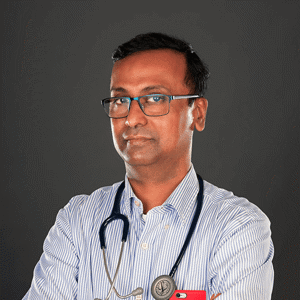Published: 24 November 2021
Professor Debasish Banerjee recently completed his inaugural lecture at St George’s, University of London. Inaugural lectures offer newly arrived or promoted professors the opportunity to introduce themselves, update colleagues on current and future research plans, and share their research with wider audiences. We caught up with Professor Banerjee to get his reflections on his inaugural lecture and to understand a bit more about his background in academia and beyond.
Life at St George’s

Discussing his time at St George’s thus far, Professor Banerjee begins, “I have been at St George’s for quite some time. For nearly 10 years I was the clinical sub dean for medical students on placement at St George’s Trust, managing the quality of clinical placements and improving student experience. Now I am serving as the Quality Lead for entire MBBS program.
“In the new role I've already visited different trusts like the East Surrey, the Royal Surrey, and Croydon University Hospitals, and I'll be going to St Peter’s Hospital soon.
“I have also enjoyed all of this time being the Lead for undergraduate education in the renal department teaching students at the bedside and being responsible for the quality of their experience.”
Retaining a research focus
Away from his educational responsibilities, Professor Banerjee went on to detail the research he has been involved with while at St George’s, including one study which he describes as the highlight of his time at our institution.
Professor Banerjee continues, “I started doing research as soon as I came here, it was mainly looking at how we can prevent heart complications in patients with kidney disease. A highlight was showing a relationship between vitamin D and abnormal blood vessel function followed by two intervention trials showing an improvement in blood vessel function with vitamin D therapy. We were very excited about it.
“The other highlight about that study is that we did it with partners in India. To be able to do something across two different countries and deliver it was another big achievement. The collaboration was a big learning point for me in how to work with people.”
Finding motivation and support
Achieving success within a career in research and education usually occurs alongside finding a balance of personal motivations and support from those around you. For Professor Banerjee his drive and determination come from the immense pride in the work he does.
“I think a few things motivate me,” he says. “Firstly, the ability to treat patients - no matter what happens to me with funding and publications, I can always go back and start treating patients, it is in my nature. When a person walks into in my clinic and presents through Accident and Emergency, and shares the details of their problems, I clinically evaluate them, plan management to alleviate their symptoms and determine ways to make them better. I love it because you can see them getting better. That gratification when the patient starts smiling or you know they're better is a great feeling.
“The second thing that motivates me is my interaction with students. For example, today I was teaching three junior doctors, discussing the problems that kidney patients present with, and before we knew it one hour and 40 minutes had gone by. I love active learning where not all the information is given and as a teacher you can guide students, let them make mistakes and work their own way to the correct answer. That gives me huge pleasure - urging them to think rather than simply giving them the right answer.
“I have taught at different institutions and realised that all medical students want to learn and be good doctors. Motivating them to learn can be challenging at times, but brings huge satisfaction when I can help that to happen”
Professor Banerjee then moved on to discuss how his family and home life help him switch off from the stresses and pressures of work.
“What helps me immensely is my home life. Over the last 22 years, watching my daughters growing up, moving from nursery to medical school, dropping them off at school, cooking and cleaning was the greatest pleasure and privilege.
“My wife and daughters are amazing and are a big distraction from work. As soon as I get home, I forget everything about work because food has to be made and put on the table within half an hour, plates have to be cleaned, homework checked, and so on.”
What the future holds
In terms of plans for the future, Professor Banerjee has both teaching and research ambitions that he wants to fulfil.
“One thing I've got plans for, which I haven't acted on yet, is basic science teaching for year one and two students. We collect feedback and will be able to use this to highlight areas of excellence and areas which may need improvement.
“Number two, we are starting a trial which we have been designing for the last three years and is very close to my heart. I'm trying to use a drug which prevents hospital admissions for heart failure and kidney failure patients. If the drugs work, I'll be thrilled.
“The other trial I’m working on, which again is something I've been working on for the last six or seven years, is a trial around cardiac investigation. Patients who were on the transplant waiting list will be randomly selected to have regular cardiac investigations or not.
“This is a very large trial and is collaborative. I'm working with colleagues in Vancouver and Sydney, and I'm going to lead the UK side of things at St George’s alongside St Heliers Guys, Kings, Brighton, Birmingham, Glasgow and Newcastle Renal Units.”
The next speaker in the inaugural lecture series will be Professor Rachel Allen on Monday 29 November. Further details on the event, including how to register to attend, can be found here.